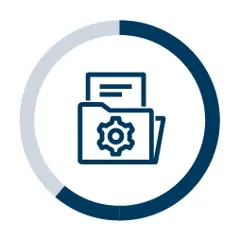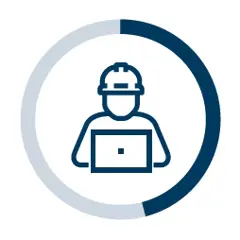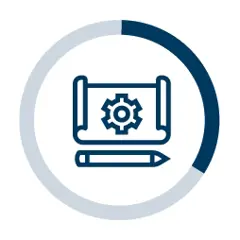How AI Agents Improve Retail and Distribution Supply Chains
AI agents are transforming supply chains by:
AI Agents for Retail and Distribution
AI agents are driving measurable impact across retail and distribution. Here's how they help organisations reduce costs, improve speed, and make smarter decisions, at scale.


AI Agents for Retail and Distribution
AI agents are driving measurable impact across retail and distribution. Here's how they help organisations reduce costs, improve speed, and make smarter decisions, at scale.

AI agents can autonomously analyse data, make decisions, and execute actions across a wide range of business functions. For organisations seeking to improve efficiency, reduce operational complexity, and enhance customer responsiveness, AI agents offer a strategic advantage.
From optimising inventory and forecasting demand to personalising customer experiences and streamlining logistics, the potential for impact is significant. Engaging with this technology isn't just about innovation; it's about staying competitive and building resilient, data-driven operations.
What are AI Agents?
AI agents are autonomous software systems that perceive their environment, reason, and act to achieve specific goals. Unlike traditional automation tools, AI agents can:
How AI Agents Improve Retail and Distribution Supply Chains
AI agents are transforming supply chains by:

Predicting demand, reducing overstock and stockouts

Automating route planning and shipment tracking

Identifying supplier risks and automating reorders

Handling returns, answering queries, and personalising experiences

Automating repetitive tasks and minimising human error
Tesco has been using AI to improve demand forecasting and supply chain management.
M&S has looked into AI for personalisation and customer service tools. These examples help ground the narrative in a UK context, making it more relatable for local audiences.
Retail and distribution are sectors defined by speed, accuracy, and customer expectations. Traditional systems struggle to keep up with the growing complexity of omnichannel environments, unpredictable demand, and the rising cost of logistics. AI agents offer a solution that scales, learns, and adapts continuously, giving organisations the agility and intelligence they need to compete.
What are the types of Agents?
| Type of Agent | Description | Use case |
|---|---|---|
| Simple Reflex Agents | React to current input without memory | Automated checkout systems |
| Model-Based Agents | Use internal models to predict outcomes | Inventory forecasting |
| Goal-Based Agents | Plan actions to achieve specific objectives | Route optimisation |
| Utility-Based Agents | Choose actions based on utility or value | Dynamic pricing engines |
| Learning Agents | Improve performance over time through feedback | Personalised product recommendations |
| Multi-Agent Systems | Collaborate with other agents to solve complex problems | End-to-end supply chain orchestration |
Recent launches from Microsoft
These tools are already being used by companies like Fujitsu, NTT DATA, and Dow to automate everything from sales to shipping invoices.
How Data Affects AI Agents
Data is the lifeblood of AI agents. Their effectiveness depends on:
Without a robust data infrastructure, even the smartest agent will fall short.
Here’s a step-by-step path to AI agent adoption:
Final thoughts
The adoption of AI agents in retail and distribution is not merely a technological upgrade, it is a business imperative.
Organisations that invest in these capabilities position themselves to operate with greater precision, agility, and customer alignment. The benefits are measurable: faster decision-making, reduced waste, improved service levels, and stronger margins.
By proactively integrating AI agents into their operations, businesses can unlock new value and ensure they are equipped to thrive in a complex and fast-moving market environment. But diving into AI transformation, organisations need to assess their preparedness. That’s where the HSO AI Readiness Assessment comes in.
This 4-day engagement evaluates your current data infrastructure, business goals, and AI maturity. It helps identify high-impact use cases and builds a roadmap to implement AI effectively, ensuring your supply chain is ready for intelligent automation and innovation.
What AI means for Retail and Distribution:
We, and third parties, use cookies on our website. We use cookies to keep statistics, to save your preferences, but also for marketing purposes (for example, tailoring advertisements). By clicking on 'Settings' you can read more about our cookies and adjust your preferences. By clicking 'Accept all', you agree to the use of all cookies as described in our privacy and cookie policy.
Purpose
This cookie is used to store your preferences regarding cookies. The history is stored in your local storage.
Cookies
Location of Processing
European Union
Technologies Used
Cookies
Expiration date
1 year
Why required?
Required web technologies and cookies make our website technically accessible to and usable for you. This applies to essential base functionalities such as navigation on the website, correct display in your internet browser or requesting your consent. Without these web technologies and cookies our website does not work.
Purpose
These cookies are stored to keep you logged into the website.
Cookies
Location of Processing
European Union
Technologies Used
Cookies
Expiration date
1 year
Why required?
Required web technologies and cookies make our website technically accessible to and usable for you. This applies to essential base functionalities such as navigation on the website, correct display in your internet browser or requesting your consent. Without these web technologies and cookies our website does not work.
Purpose
This cookie is used to submit forms to us in a safe way.
Cookies
Location of Processing
European Union
Technologies Used
Cookies
Expiration date
1 year
Why required?
Required web technologies and cookies make our website technically accessible to and usable for you. This applies to essential base functionalities such as navigation on the website, correct display in your internet browser or requesting your consent. Without these web technologies and cookies our website does not work.
Purpose
This service provided by Google is used to load specific tags (or trackers) based on your preferences and location.
Why required?
This web technology enables us to insert tags based on your preferences. It is required but adheres to your settings and will not load any tags if you do not consent to them.
Purpose
This cookie is used to store your preferences regarding language.
Cookies
Why required?
We use your browser language to determine which language to show on our website. When you change the default language, this cookie makes sure your language preference is persistent.
Purpose
This service is used to track anonymized analytics on the HSO.com application. We find it very important that your privacy is protected. Therefore, all data is collected and stored on servers owned by HSO with no third-party dependencies. This cookie helps us collect data from HSO.com so that we can improve the website. Examples of this are: it allows us to track engagement by page, measuring various events like scroll-depth, time on page and clicks.
Cookie
Purpose
This cookie enables HSO to run A/B tests across the HSO.com application. A/B testing (also called split testing) is comparing two versions of a web page to learn how we can improve your experience. All data is collected and stored on servers owned by HSO with no third-party dependencies.
Purpose
With your consent, this website will load Google Analytics to track behavior across the site.
Cookies
Purpose
With your consent, this website will load the Microsoft Clarity script, which helps us understand how people use the site. The cookies set by Clarity collect session-level data like how the visitor landed on the site, which pages they viewed, their language preference, and even their general location. This data powers Clarity’s features like heatmaps and session recordings, helping us see which parts of a page get attention and where users drop off. The goal isn’t to track individuals, but to understand patterns that can improve the user experience. Learn more about Microsoft Clarity cookies here.
Cookies
Technologies Used
Cookies
Purpose
With your consent, this website will load the Google Advertising tag which enables HSO to report user activity from HSO.com to Google. This enables HSO to track conversions and create remarketing lists based on user activity on HSO.com.
Possible cookies
Please refer to the below page for an updated view of all possible cookies that the Google Ads tag may set.
Cookie information for Google's ad products (safety.google)
Technologies Used
Cookies
Purpose
With your consent, we use IPGeoLocation to retrieve a country code based on your IP address. We use this service to be able to trigger the right web technologies for the right people.
Purpose
With your consent, we use Leadfeeder to identify companies by their IP-addresses. Leadfeeder automatically filters out all users visiting from residential IP addresses and ISPs. All visit data is aggregated on the company level.
Cookies
Purpose
With your consent, this website will load the LinkedIn Insights tag which enables us to see analytical data on website performance, allows us to build audiences, and use retargeting as an advertising technique. Learn more about LinkedIn cookies here.
Cookies
Purpose
With your consent, this website will load the Microsoft Advertising Universal Event Tracking tag which enables HSO to report user activity from HSO.com to Microsoft Advertising. HSO can then create conversion goals to specify which subset of user actions on the website qualify to be counted as conversions. Similarly, HSO can create remarketing lists based on user activity on HSO.com and Microsoft Advertising matches the list definitions with UET logged user activity to put users into those lists.
Cookies
Technologies Used
Cookies
Purpose
With your consent, this website will load the Microsoft Dynamics 365 Marketing tag which enables HSO to score leads based on your level of interaction with the website. The cookie contains no personal information, but does uniquely identify a specific browser on a specific machine. Learn more about Microsoft Dynamics 365 Marketing cookies here.
Cookies
Technologies Used
Cookies
Purpose
With your consent, we use Spotler to measures more extensive recurring website visits based on IP address and draw up a profile of a visitor.
Cookies
Purpose
With your consent, this website will show videos embedded from Vimeo.
Technologies Used
Cookies
Purpose
With your consent, this website will show videos embedded from Youtube.
Cookies
Technologies Used
Cookies
Purpose
With your consent, this website will load the Meta-pixel tag which enables us to see analytical data on website performance, allows us to build audiences, and use retargeting as an advertising technique through platforms owned by Meta, like Facebook and Instagram. Learn more about Facebook cookies here. You can adjust how ads work for you on Facebook here.
Cookies
Purpose
With your consent, we use LeadInfo to identify companies by their IP-addresses. LeadInfo automatically filters out all users visiting from residential IP addresses and ISPs. These cookies are not shared with third parties under any circumstances.
Cookies
Purpose
With your consent, we use TechTarget to identify companies by their IP address(es).
Cookies
Purpose
This enables HSO to personalize pages across the HSO.com application. Personalization helps us to tailor the website to your specific needs, aiming to improve your experience on HSO.com. All data is collected and stored on servers owned by HSO with no third-party dependencies.
Purpose
With your consent, we use ZoomInfo to identify companies by their IP addresses. The data collected helps us understand which companies are visiting our website, enabling us to target sales and marketing efforts more effectively.
Cookies